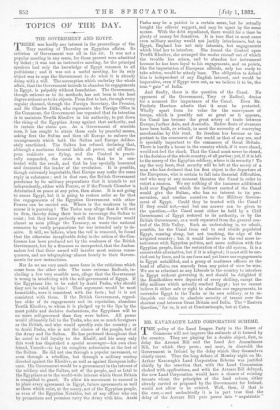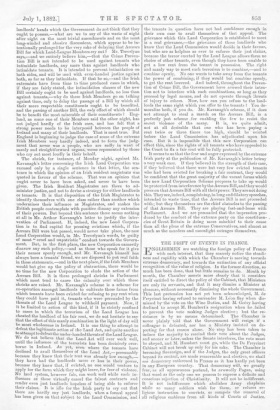MR. KAVANAGH'S LAND CORPORATION SCHEME.
landlords' hands which the Government do not think that they ought to possess,—what are we to say of the waste of night after night on the most trivial amendments and on the most long-winded and abusive discussions, which appear to be in- tentionally prolonged for the very sake of delaying that Arrears till for which Land-League Members cry out ? Mr. TreveIyan says,—and we entirely believe him,—that the Crime Preven- tion Bill is not intended to be used against tenants who intimidate landlords, any more than against landlords who intimidate tenants. It is intended to prevent intimidation on both sides, and will be used with even-handed justice against both, so far as they intimidate. If that be so,—and the Irish extremists have from time to time produced cases in which, if they are fairly stated, the intimidation clauses of the new Bill certainly ought to be used against landlords, no less than against tenants,—why do these Irish Members go on talking against time, only to delay the passage of a Bill by which all their more respectable constituents ought to be benefited, and the passing of another Bill, the only effect of which should be to benefit the most miserable of their constituents? Eng- land, as some one of their Members said the other night, has not judged hardly of the Irish case, and has felt that a strong power needs to be interposed between the people of Ireland and many of their landlords. That is most true. But England is beginning to judge the case of some of the extreme Irish Members very hardly indeed, and to form the judg- ment that never was a people, who are sadly in want of manly and straightforward organs, worse represented by those who cry out most loudly in their behalf.
The shriek, for instance, of Monday night, against Mr. Kavanagh's letter concerning the hish Land Corporation was excused only by a single sentence in that letter, the sen- tence in which the opinion of an Irish resident magistrate was quoted in favour of the scheme. That was an opinion that ought never to have been asked, and never to have been given. The Irish Resident Magistrates are there to ad- minister justice, and not to devise a strategy for either landlords or tenants. It is that disposition of the Irish Magistrates to identify themselves with one class rather than another which undermines their influence as Magistrates, and makes the British people contemplate with positive dismay any extension of their powers. But beyond this sentence there seems nothing at all in Mr, Arthur Kavanagh's letter to justify the inter- vention of Parliament. If, indeed, the new Land Corpora- tion is to find capital for pressing evictions which, if the Arrears Bill were but passed, would never take place, the new Land Corporation would, in Mr. Trevelyan's words, be guilty of most "cruel and unpatriotic" conduct towards the Govern- ment. But, in the first place, the new Corporation earnestly disavow any such policy,—and as those who speak for it give their names openly enough, and Mr. Kavanagh himself has always been a tenants' friend, we are disposed to put real faith in these statements,—and in the next place, if the Irish Members would but give up the policy of obstruction, there would be no time for the new Corporation to elude the action of the Arrears Bill. It is these prolonged shrieks in Parliament which most tend to cause the calamity over which these shrieks are raised. Mr. Kavanagh's scheme is a scheme for co-operation amongst landlords to cultivate those farms from which tenants have been evicted for refusing to pay rent when they could have paid it, tenants who were persuaded by the threats of the Land League to withhold payment. Now, if it be limited to action of this kind, if it be strictly confined to cases in which the terrorism of the Land League has cheated the landlord of his fair rent, we do nett hesitate to say that the effect of this manly combination in the light of day will be most wholesome in Ireland. It is one thing to attempt to defeat the legitimate action of the Land Act, and quite another to attempt to defeat the under-handed threats of the Land League. We do not believe that the Land Act will ever work well, until the influence of the terrorists has been decisively over- borne in Ireland. As yet, even where the tenants have declined to avail themselves of the Land Act,—presumably ma 3 because they knew that their rent was already low enough,— they have had the landlords more or less in their power, because they knew that, if evicted, no one would venture to apply for the farm which they might leave, for fear of violence. No land system, however fair, can work well while such in- fluences as these virtually cancel the fairest contracts and render even just landlords hopeless of being able to enforce their claims. It is idle for the Irish party to cry out that there are hardly any just landlords, when a formal appeal has been given on that subject to the Land Commission, and the tenants in question have not had confidence enough in their own case th avail themselves of that appeal. The grievance which this Land Corporation is established to meet is a real grievance,—the grievance of those landlords who know that the Land Commission would decide in their favour, but who are as helpless as ever to enforce their just claims, because the terror exerted by the Land League allows them no choice of other tenants, even though they have been unable to get a low rent from the tenant in possession. The right and manly way to meet such terrorism is to combine,—and to combine openly. No one wants to take away from the tenants the power of combining, if they would but combine openly, to get the rent lowered. And indeed, throughout the Preven- tion of Crime Bill, the Government have avowed their inten- tion not to interfere with such combinations, so long as they proceed by legal means, and do not operate through;.,hreats of injury to others. Now, how can you refuse to the land- lords the same right which you offer to the tenants ? You de- moralise both, if you do. Mr. Kavanagh's scheme, if it does not attempt to steal a march on the Arrears Bill, is a perfectly just scheme .for enabling the few to resist the secret violence of the many. It is, we quite admit, not at all desirable that one who has been paying a rent twice or three times too high, should be evicted before the Land Commission has adjudicated upon his case. But it is impossible that this new Corporation can effect this, since the rights of all tenants who have appealed to the Court to fix a fair rent will be fully protected.
It seems to us that the fear and anger expressed by the extreme Irish party at the publication of Mr. Kavanagh's letter betray a very weak case. If they believed in the strength of their case, if they believed that there were but very few evicted tenants who had been evicted for breaking a fair contract, they would be confident that the great majority of the vacant farms which the new Land Corporation Scheme proposes to take up would be protected from interference by the Arrears Bill, and they would press on that Arrears Bill with all their power. They are not doing this. They are,indeed, complaining, in long and dilatory speeches, intended to waste time, that the Arrears Bill is not proceeded with; but they themselves are the chief obstacles to the passing of that Arrears Bill. They are playing fast-and-loose with Parliament. And we are persuaded that the impression pro- duced by the conduct of the extreme party on the constituen- cies of Great Britain is doing more mischief to their cause than all the pleas of the extreme Conservatives, and almost as much as the murders and moonlight outrages themselves.



































 Previous page
Previous page